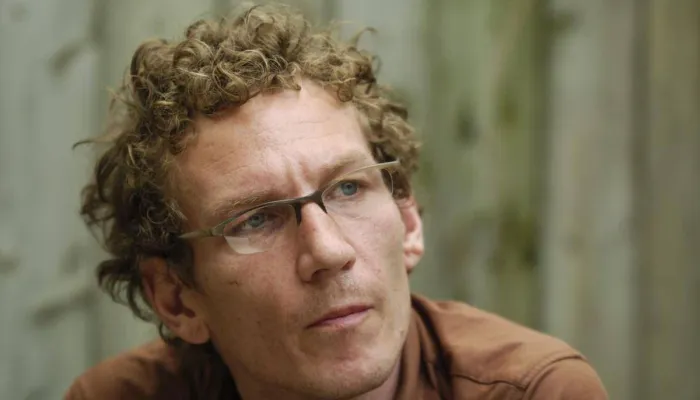Hello, listen, I’m on a field phone, do not speak until I say “over.”
Repeat, don’t talk until I say “over.” Over. Do you understand,
or was your silence intentional? Over.
Northwest of The Seven
Sisters, in a sort of bunker on stilts. Over. Last week I called in a cobra
of smoke. I was packing my gear in a panic, when
the next tower west confirmed it was only
low cloud. Over. I
get a crackling out of Alaska that sounds religious. Vladivostok. CBC.
I’ve decided I like Paganini. Over. No, leave it, or throw
it out, I won’t need it here. If ever.
Over. When storms wander
across the lower jaw of the coastal range, unloading their cargo here,
it’s like being in the engine room of something metallic
and massive. Over. My first grizzly passed
within a stone’s throw,
followed an hour later by the sucking thumps of a Parks chopper.
Nothing since. Over. Days, I rearrange stones shoaled up
at the base of the uprights and struts.
Nights, I stab at imagining
anything lovely, but end up laughing. Over. The forest goes quiet as if
waiting for me to finish. Listens hard to whatever isn’t
itself. Makes me anxious. I think
of how we ever came to . . .
[inaudible] given the arm’s length I kept joy at. Over. Affection stung
like a rasp drawn over [inaudible]. I thinned the world of it.
Don’t live as I did. Allow for terms
of relief. The black
maples aligned along streets, waddling skunks, their dark dusters
through the foxglove, your shoulder bag, shoes, the faces
of strangers; all may strike you as fibres
of a tremendous sadness.
That’s you in among the weave of it, new. Over. Is that important?
I’ve been contracted to watch this horizon and will
be here until something happens. Over.
Tell them it will. Over.
- Who is speaking in this poem? Where is the speaker located?
- What is the mood of the speaker?
- Do you think the speaker is having a conversation with another person or is he or she speaking essentially to him- or herself? What in the poem supports your interpretation?
- What do you learn about the speaker as you move through the poem?
- What do you think the inclusion, towards the end of the poem, of the notation “[inaudible]” suggests? Could this be a transcript of a recording, rather than something happening in real time? If this is a document of a recorded call made in the past, what does this suggest about the speaker?
- If you were going to recite this poem, what tone would you use and would you vary it throughout the poem? How would you choose to handle the times when the word “[inaudible]” appears? Would you emphasize or de-emphasize these moments?
- Write a one-sided dialogue in which the speaker’s lines suggest what is being heard on the other end of the phone.
Useful Links
Watch 2015 PIV Finalist Kiera Sandrock recite “Fire Watch”
https://poetryinvoice.ca/binge/videos/phoenix-sandrock-fire-watch-ken-babstock
Watch Ken Babstock read from his book Airstream Land Yacht, which was nominated for the 2007 Griffin Poetry Prize, and from Methodist Hatchet, which won the 2012 Griffin Poetry Prize:
http://www.griffinpoetryprize.com/see-and-hear-poetry/a-g/ken-babstock/
Ken Babstock, “Fire Watch” from Days into Flatspin. Copyright © 2001 by Ken Babstock. Reprinted by permission of House of Anansi Press.
Source: Days into Flatspin (House of Anansi Press, 2001).





